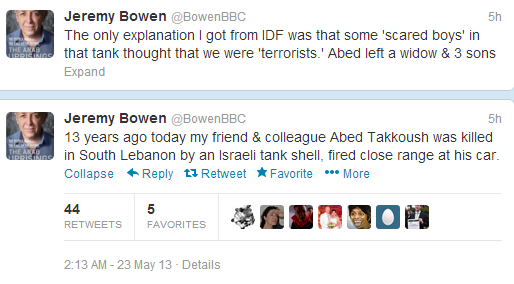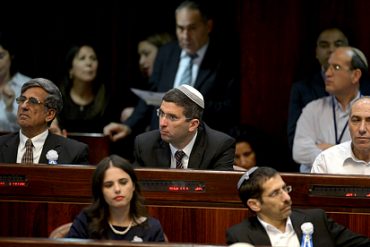Early in the morning of Tuesday May 23rd 2000 – the day before the completion of the Israeli withdrawal from southern Lebanon – a tank crew stationed on the border fence near Kibbutz Menara received an intelligence alert concerning the likelihood of terrorists firing anti-tank missiles at IDF tanks and armoured vehicles. Later in the day, the crew spotted a Lebanese vehicle transporting men in civilian clothing and suspected that these were Hizballah terrorists carrying equipment for firing an anti-tank missile. The tank crew was given permission to fire at the suspected terrorists.
Later it emerged that the men were actually a BBC film crew headed by Jeremy Bowen and that driver Abed Takkoush had been killed. The IDF investigated the incident and issued an apology. Understandably, that tragic incident appears to be still very much at the forefront of Bowen’s mind, although he does not appear to accept that it was possible to mistake three men travelling in a war zone in a car with Lebanese plates, and carrying camera equipment, for Hizballah terrorists dressed – as was very often the case – in civilian clothing.
One of Bowen’s repeated claims is that the IDF soldiers should have been able to identify him as a civilian because of his dress at the time.
“I was in sight of the Israeli settlement [Manara]. I thought it would be fairly quiet. I even waved my arms over my head to show we were civilians. I had no helmet and was wearing a pink shirt”.
In other words, Bowen apparently believes that Hizballah terrorists never wear pink shirts and that his safety should have been guaranteed because Israeli soldiers ought to have been able to identify him and his colleagues as members of the press on the basis of the colour of his clothing.
However, this recent picture (retweeted by Bowen) taken on a rooftop above Taksim Square in Istanbul suggests that Bowen does not have the same expectations with regard to the abilities of the Turkish riot police to recognise his pink shirt as a sign of his press credentials.





